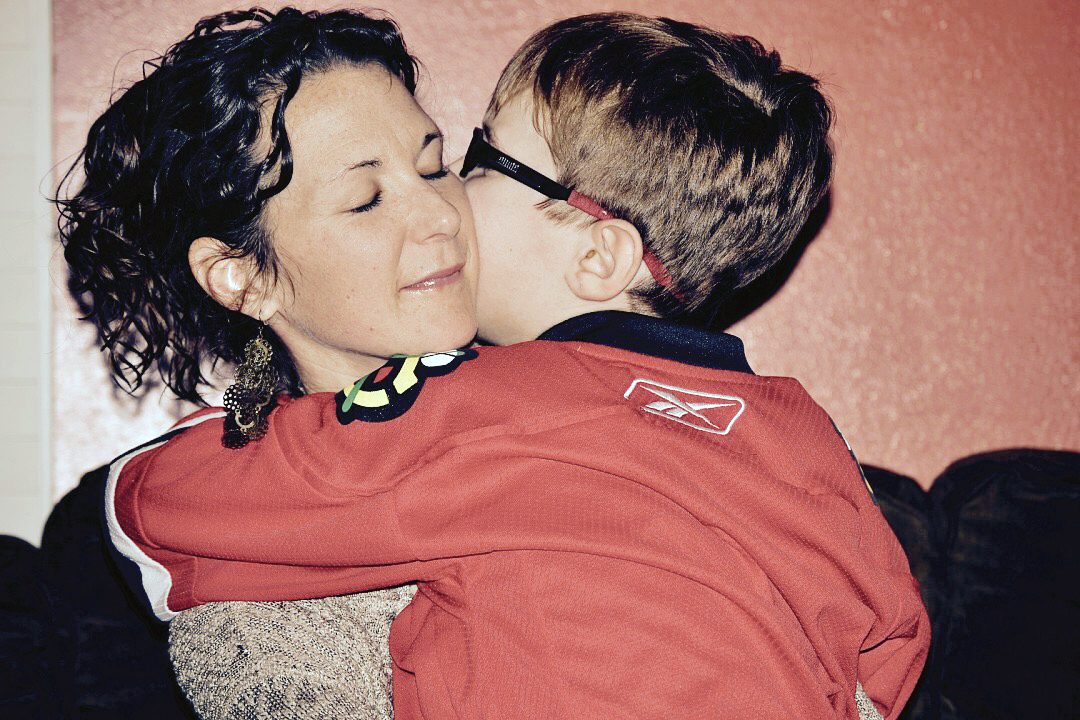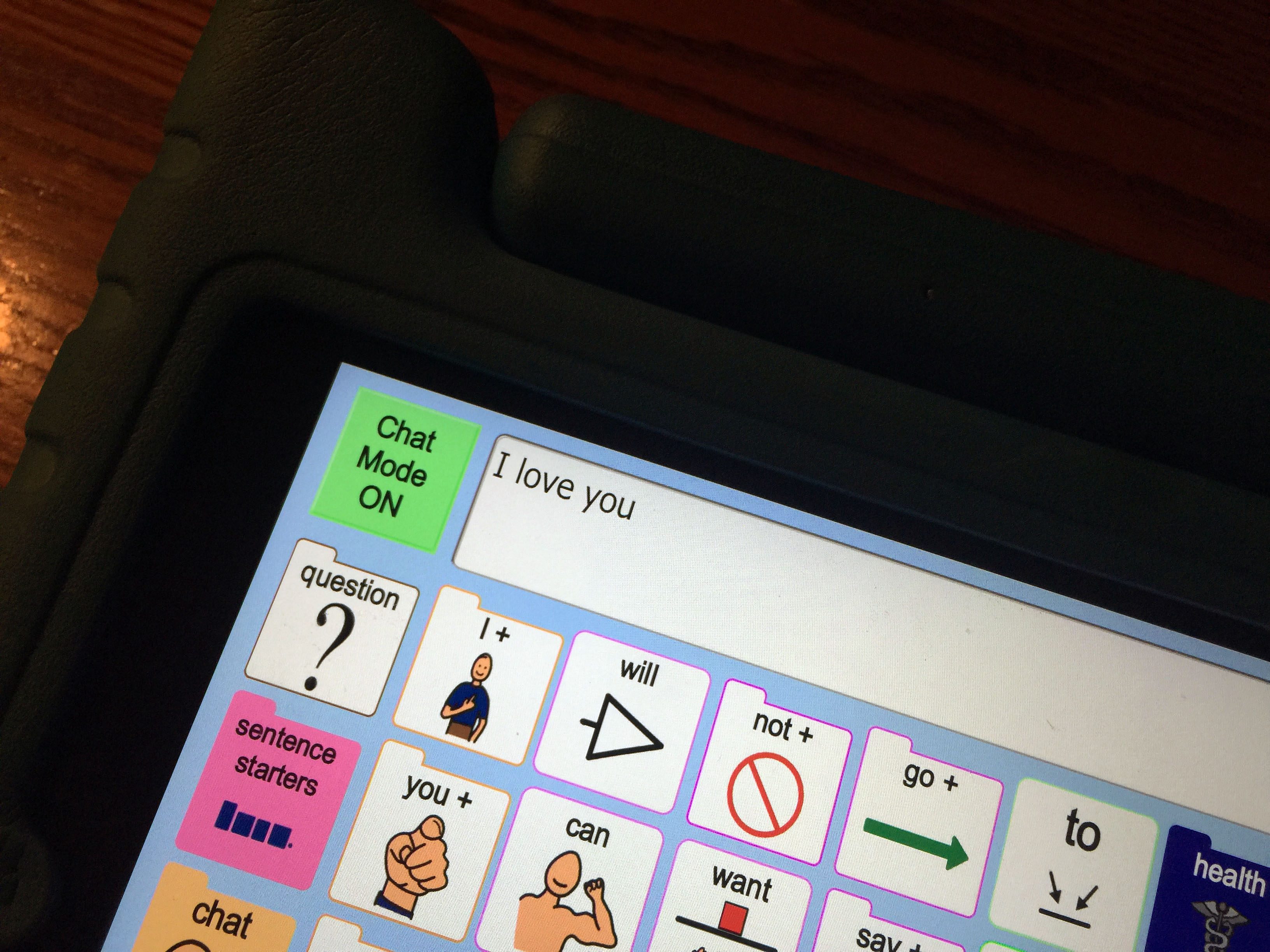
“Saying ‘I Love You'” – Beth
It wasn’t until this school year, Benny’s 7th grade year, that we realized he didn’t have the phrase “I love you” on his communication device. Benny is totally nonverbal and relies on assistive technology to communicate. He does have one approximation of “yeah” in his verbal catalog, but other than that, he uses his voice primarily to indicate feelings only— he’ll screech loudly when he’s mad his TV time is over.
He’ll laugh at his favorite books or he’ll use one-syllable guttural sounds to get our attention. For a reason that is still so unknown and curious to me, GAMT robbed him of his verbal skills. Some skills have developed since treatment, but his speech development remains stagnant.
He uses all kinds of readily available phrases on his iPad: “I need help,” “Please put that word in my device,” “I’m done,” “I’m ready,” to name a few. But it wasn’t until he was 12 that we discovered he didn’t have “I love you.” His speech therapist added it immediately. It had me thinking though… I knew all this time Benny loved me. He didn’t need to say it. If I paid very close attention, I could see all the ways Benny says “I love you.”

One of Benny’s favorite ways to bond with someone is to interact during a favorite TV show. He loves listening to us explain all the information about the baseball game— the inning, how many balls and strikes and outs, the score. And he’ll giggle as he signals that every player up to bat is going to hit a home run, indicated by holding up his arms in the football signal for “touchdown.” Or he wants to watch Wheel of Fortune with us so we can all cheer when they win the big money or lament when they land on “lose a turn.” In the sweetest way, Benny will look at us and gently pat the spot next to him on the couch, indicating for us to come sit with him. There is no way to avoid this persuasive invitation. He’ll continue patting and looking until one of us sits down. This is his way of saying “I love you. Come sit with me and talk.”
Ask anyone, Benny has the most piercing stare. I have never seen someone communicate with his eyes so clearly. It’s that idea that when someone loses a sense, the others compensate for that loss. While I know his voice isn’t a sense, it’s the same idea. I know there’s a lot going on inside his head, the words just have trouble finding their way out. One of his favorite ways to show affection is to physically grab my face, on either cheek, and turn my face toward his. He’ll glare into my eyes and it’s in those eyes that I can see very clearly that he loves me.
Sometimes when I tuck Benny into bed, he’ll pull back the covers and pat the spot next to him in the bed for me to lie down. I’ll lie with him and brush his hair with my fingers while he falls asleep. And then he’ll fling his arm over on my body telling me to rub his arm. And if I stop tickling his arm, he’ll take my hand and put it right back on his arm where I left off. “I love you and goodnight,” says Benny.
And perhaps my favorite is the middle of the night “I love you.” Benny will frequently come into our room in the middle of the night needing to be walked back to bed and tucked in. Being non-verbal, he only has so many options to wake us up. Our girls usually whisper-yell our names until we frantically spring up out of bed, assuming a fire is ravaging the house or some other awful scene is unfolding. I think most parents are familiar with this unsavory night-waking. Not our Benny. His toolbox doesn’t have the usual selections, so he has chosen the best alternative. He kisses my face to wake me up. If one has to be yanked out of a slumber, a soft kiss on my face is the most charming way to make that happen. We’ll enjoy the quiet walk down the hall to his room where I tuck him back in and I’ll return his “I love you” kiss with my own.
Don’t be fooled, for as many ways as Benny has to say that he loves me, he has also found nonverbal ways to tell me he doesn’t like me. He is pretty typical in that way. He’s been known to throw his glasses, books, his iPad. Or he’ll plop down on the floor wherever he is to stage a nonviolent protest. And now that he’s 13-years-old and 5-feet-tall, it’s pretty difficult to get the show moving once he’s decided to do that.
Every child, special needs or not, has ways of saying “I love you.” Benny does love me, I’ve never doubted that. I’m just thankful that he has taught me to sit back, be patient, and really listen to all the unspoken “I love you’s.” Without his guidance, I might have missed out on those secret love letters.





